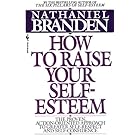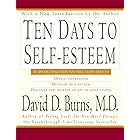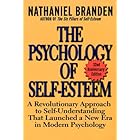Branden practically invented the concept of self-esteem and was probably most responsible for promoting it in this country. His latest book is another solid effort that builds on his previous work. He defines the titular pillars as living consciously, self-acceptance, self-responsibility, self-assertiveness, living purposefully, and personal integrity, and he describes not only their importance but how to practice them. He also looks at self-esteem within the contexts of school, work, psychotherapy, and culture and how to develop it within each. His is a balanced book--part theory, part social commentary, part self-help--that is clear, well researched, and well grounded, a valuable, credible addition to the psychological self-help shelves. Mary Ellen Sullivan
From Kirkus Reviews
Yet another rehash of his favorite subject from Branden (How to Raise Your Self-Esteem, 1987, etc.), a monthly columnist for New Woman magazine. Impelled to write, he says, by the recent explosion in the self-esteem movement, as well as by the ``abyss'' between his own understanding of the subject and that of most other writers, Branden--who's been lecturing on self-esteem since the 1950's- -claims that this new work is ``the climax of all the work that preceded it.'' Here, he looks first at the nature and sources of self-esteem, then examines what actions can be taken to generate and sustain that quality, and, finally, considers external influences on self-esteem: the home, the workplace, and the general culture. The ``six pillars'' of the title are elaborated as six actions that, if practiced, promise to bring about great changes in one's life. They include the arts of living consciously and purposefully; self-acceptance; self-responsibility; self- assertiveness; and personal integrity. Chapters on each feature sentence-completion exercises, a staple of Branden's mode of therapy. The idea is that rapid and repeated completion of a series of sentence fragments (``If I pay more attention to how I deal with people today...) increases self-knowledge. Throughout, in order to lighten the text, Branden also incorporates lots of lists, headings, and anecdotes. Two appendices prove a measure of the author's own self-esteem: One is a critique of others' ideas on the subject, while a second, entitled ``Recommendations for Further Study,'' outlines 11 of Branden's previous books and plugs his L.A.-based institute on self-esteem. Inflated and repetitious. -- Copyright ©1993, Kirkus Associates, LP. All rights reserved.
Review
"The ultimate work on self-esteem. Truly a classic." --T. George Harris, former editor of American Health and Psychology Today
From the Publisher
"Nathaniel Branden's book is the culmination of a lifetime of clinical practice and study, already hailed in its hardcover edition as a classic and the most significant work on the topic. Immense in scope and vision and filled with insight into human motivation and behavior, The Six Pillars Of Self-Esteem is essential reading for anyone with a personal or professional interest in self-esteem. The book demonstrates compellingly why self-esteem is basic to psychological health, achievement, personal happiness, and positive relationships. Branden introduces the six pillars-six action-based practices for daily living that provide the foundation for self-esteem-and explores the central importance of self-esteem in five areas: the workplace, parenting, education, psychotherapy, and the culture at large. The work provides concrete guidelines for teachers, parents, managers, and therapists who are responsible for developing the self-esteem of others. And it shows why-in today's chaotic and competitive world-self-esteem is fundamental to our personal and professional power. "Brilliant, laser-focused and critically relevant, Dr. Branden's 'pillars' give us a lifelong set of foundations upon which to build our families, our schools and our businesses."--Dennis Waitley, Ph.D., author of The Psychology Of Winning.
From the Inside Flap
Nathaniel Branden's book is the culmination of a lifetime of clinical practice and study, already hailed in its hardcover edition as a classic and the most significant work on the topic. Immense in scope and vision and filled with insight into human motivation and behavior, The Six Pillars Of Self-Esteem is essential reading for anyone with a personal or professional interest in self-esteem. The book demonstrates compellingly why self-esteem is basic to psychological health, achievement, personal happiness, and positive relationships. Branden introduces the six pillars-six action-based practices for daily living that provide the foundation for self-esteem-and explores the central importance of self-esteem in five areas: the workplace, parenting, education, psychotherapy, and the culture at large. The work provides concrete guidelines for teachers, parents, managers, and therapists who are responsible for developing the self-esteem of others. And it shows why-in today's chaotic and competitive world-self-esteem is fundamental to our personal and professional power.
From the Back Cover
Nathaniel Branden's book is the culmination of a lifetime of clinical practice and study, already hailed in its hardcover edition as a classic and the most significant work on the topic. Immense in scope and vision and filled with insight into human motivation and behavior, "The Six Pillars Of Self-Esteem is essential reading for anyone with a personal or professional interest in self-esteem. The book demonstrates compellingly why self-esteem is basic to psychological health, achievement, personal happiness, and positive relationships. Branden introduces the six pillars-six action-based practices for daily living that provide the foundation for self-esteem-and explores the central importance of self-esteem in five areas: the workplace, parenting, education, psychotherapy, and the culture at large. The work provides concrete guidelines for teachers, parents, managers, and therapists who are responsible for developing the self-esteem of others. And it shows why-in today's chaotic and competitive world-self-esteem is fundamental to our personal and professional power.
About the Author
Nathaniel Branden, Ph.D. studied psychology at UCLA and did his graduate work at New York University. His reputation as an original and challenging thinker began with articles in the Objectivist, a journal of ideas that he co-founded with novelist-philosopher Ayn Rand. He is the renowned author of twenty books, including My Years with Ayn Rand, Taking Responsibility, and The Art of Living Consciously. He is in private practice in Los Angeles and offers consulting to corporations worldwide.























